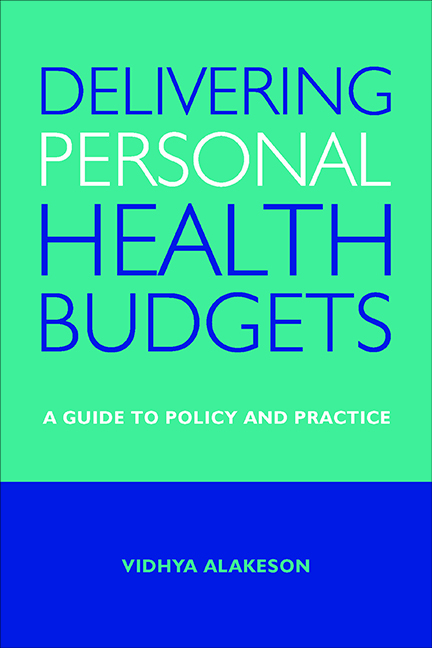Book contents
- Frontmatter
- Contents
- List of tables and figures
- Acknowledgements
- Prologue: Stephen’s story
- Introduction
- Section 1 Introducing personal health budgets
- Section 2 Implementing personal health budgets
- Section 3 Personal health budgets and organisational change in the NHS
- Conclusion
- Epilogue: Jonathan’s story
- References
- Index
nine - Managing and monitoring the money
Published online by Cambridge University Press: 03 February 2022
- Frontmatter
- Contents
- List of tables and figures
- Acknowledgements
- Prologue: Stephen’s story
- Introduction
- Section 1 Introducing personal health budgets
- Section 2 Implementing personal health budgets
- Section 3 Personal health budgets and organisational change in the NHS
- Conclusion
- Epilogue: Jonathan’s story
- References
- Index
Summary
Changes in legislation introduced as part of the PHB pilot made it legally possible for the first time for the NHS to transfer money to individuals rather than to commissioners or providers. However, to make PHBs as inclusive as possible, it has been necessary to develop a continuum of options for how individuals can manage the money allocated to them rather than rely only on direct payments. The continuum allows PHB holders to exercise the same level of choice over how their needs are met, but with differing levels of responsibility for day-to-day money management. There are three broad options for how individuals can manage their PHB. They can take it as a ‘direct payment’ – a cash payment into their bank account; it can be managed by a third party; or it can continue to be held by commissioners as a notional or virtual budget. At present the legislative authority to offer a direct payment only covers pilot sites, but the Department of Health is extending the reach of the legislation to allow all CCGs to offer them (DH, 2013). However, it is important to remember that PHBs can be offered as notional or managed budgets without any further legislative changes and, therefore, CCGs that want to proceed with implementation do not need to delay.
This chapter discusses each of the money management options in turn before looking at the way in which PHBs are monitored and how commissioners judge whether or not they are effective. According to the Department of Health, having choice over money management is an essential part of a PHB, and whichever option a budget holder chooses, it is critical that they can exercise as much control as they choose over how and when the money is used (Fitzgerald et al, 2012a).
The three money management options
It is critical that all three money management options are available in each local area to give individuals maximum choice and not restrict PHBs to those who are interested in taking on greater responsibility. Which option is most appropriate will depend on a range of factors: the PHB holder's confidence in taking on financial responsibility; the size and complexity of the PHB and care plan; the amount of family and peer support available to the PHB holder; the extent to which the care plan includes hiring staff; and other factors.
- Type
- Chapter
- Information
- Delivering Personal Health BudgetsA Guide to Policy and Practice, pp. 101 - 110Publisher: Bristol University PressPrint publication year: 2014



